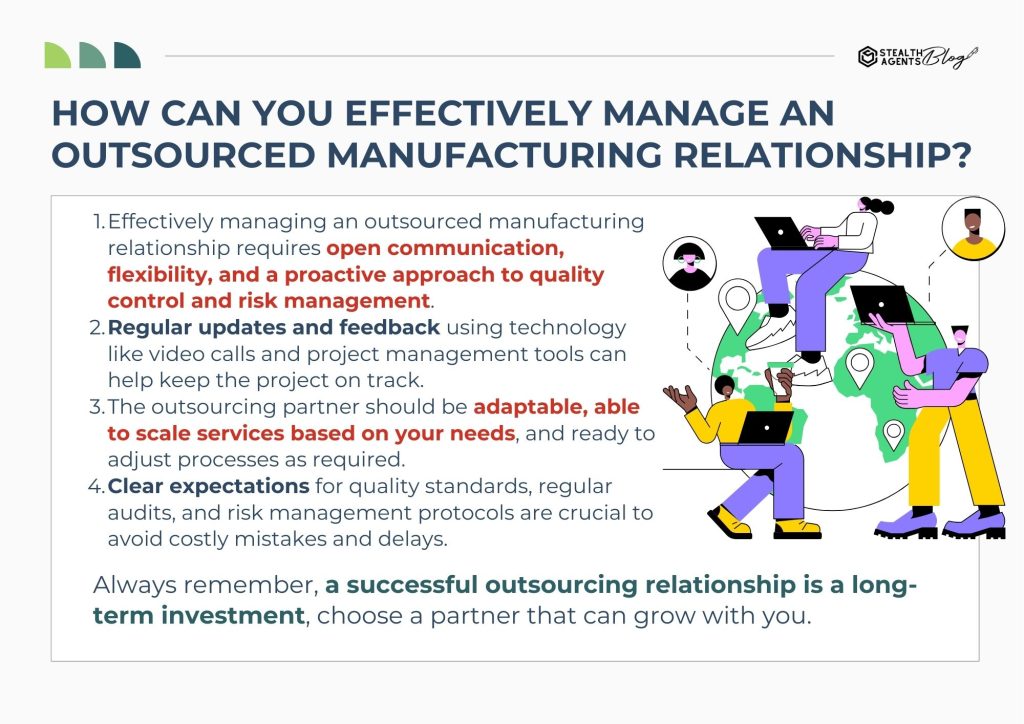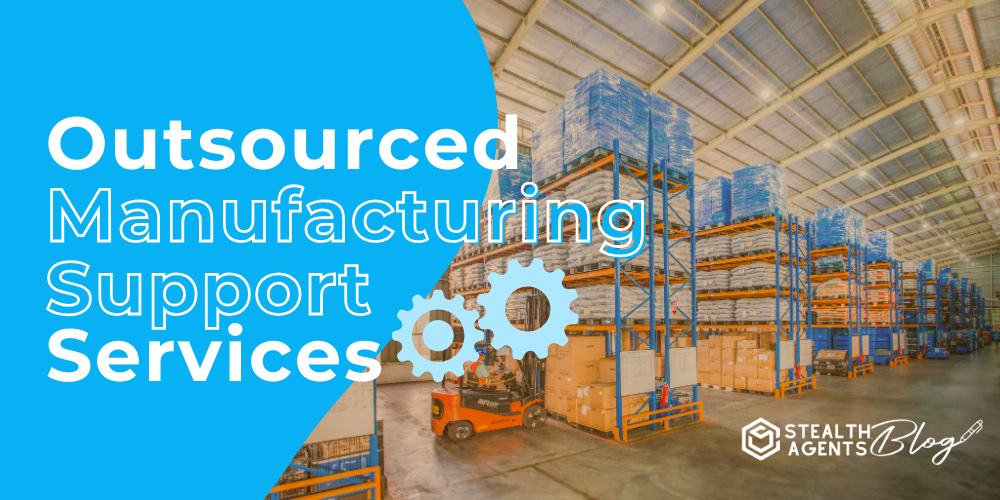Outsourced manufacturing support services streamline your operations by handling procurement, inventory, and logistics tasks so your team can focus on production and growth. Stealth Agents provides expert virtual assistants who help you cut costs, improve efficiency, and scale effortlessly—exactly when you need it.
Manufacturing companies are constantly seeking ways to optimize their operations, reduce costs, and increase efficiency. One strategy that is gaining traction is the outsourcing of manufacturing support services.
According to a report by Deloitte, 59% of businesses cited cost reduction as the primary reason for outsourcing, while 57% stated that it enables them to focus on their core business.
Outsourced manufacturing support services offer a solution by providing specialized expertise in various aspects of the manufacturing process, from design and production to logistics and after-sales support.
This approach allows companies to streamline their operations, access a broader range of skills and technologies, and adapt more quickly to changing market demands.
Consider Stealth Agents scaling your business with their highly skilled and cheap virtual assistant that will cost you less.
Book a free discussion of your preference and pricing options now!
What is Outsourced Manufacturing Support?
Outsourced manufacturing support refers to the practice of hiring external organizations to handle specific manufacturing processes or services.
This can include everything from product design and component manufacturing to assembly, packaging, and shipping.
The goal is to streamline operations, reduce costs, and leverage specialized expertise not available internally.
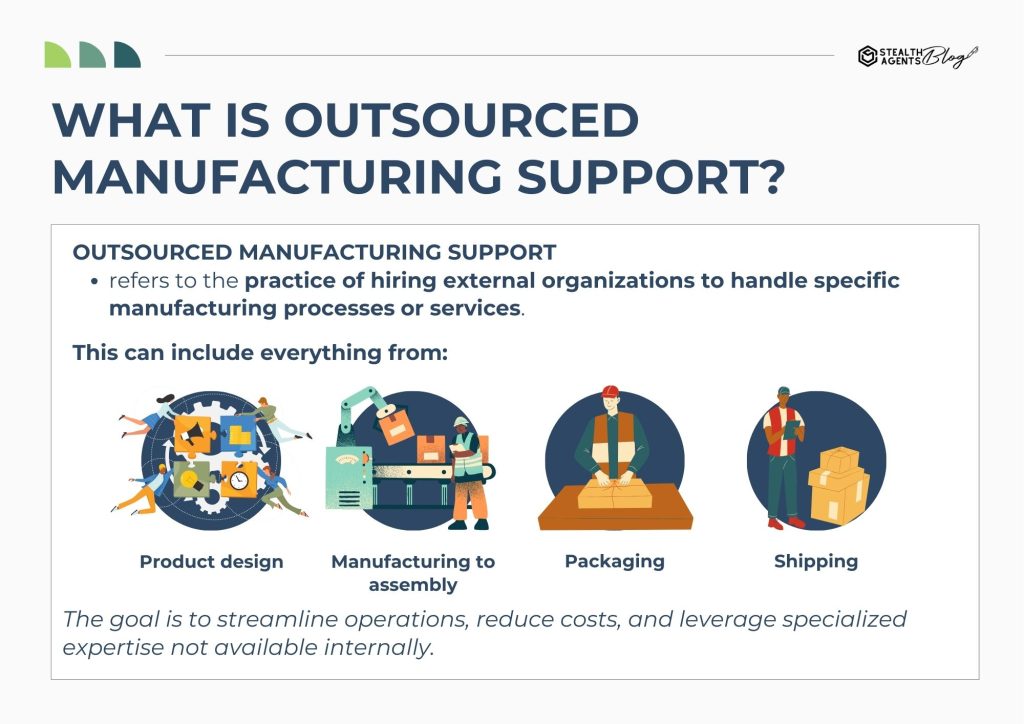
What are manufacturing support functions?
1. Production Planning and Control:
This involves scheduling, planning, tracking, and managing the production process to ensure efficiency and timely delivery of products.
This function also involves coordinating with other departments like procurement, logistics, and sales to streamline the production process.
Additionally, production planning and control also involves forecasting demand, managing inventory levels, and optimizing production schedules.
2. Quality Control and Assurance:
This function ensures that the products meet the required quality standards.
It involves testing and inspection of products, process control, and quality audits.
Quality control and assurance also involve continuous improvement initiatives to maintain and improve product quality.
This function is crucial in maintaining customer satisfaction and building a positive reputation for the company.
3. Maintenance:
This function ensures that all equipment and machinery used in the manufacturing process are in good working condition.
It involves regular check-ups, repairs, and replacement of parts when necessary.
Good maintenance practices not only increase productivity and reduce downtime but also ensure the safety of employees.
4. Logistics and Supply Chain Management:
This involves managing the flow of materials, information, and finances between suppliers, manufacturers, and customers.
It includes procurement of raw materials, inventory management, warehousing, and transportation of finished goods.
Effective logistics and supply chain management can result in cost reductions, improved delivery times, and better customer satisfaction.
5. Research and Development (R&D):
This function involves designing and developing new products or improving existing ones.
It also includes conducting market research to understand consumer needs and preferences.
The R&D team works closely with production and engineering teams to ensure the product design is feasible and cost-effective.
This function plays a critical role in driving innovation and staying competitive in the market.
6. Human Resource Management:
This involves managing the workforce involved in the manufacturing process.
It includes recruitment, training, performance management, and ensuring worker safety.
HR also plays a crucial role in creating a positive work culture and promoting employee engagement, which can ultimately lead to higher productivity and quality of products.
7. Procurement:
This function is responsible for sourcing and purchasing the necessary raw materials, machinery, equipment, and services required for the manufacturing process.
Procurement ensures that all materials are of high quality, cost-effective, and delivered on time to meet the production schedule.
This function also involves negotiating contracts and managing supplier relationships.
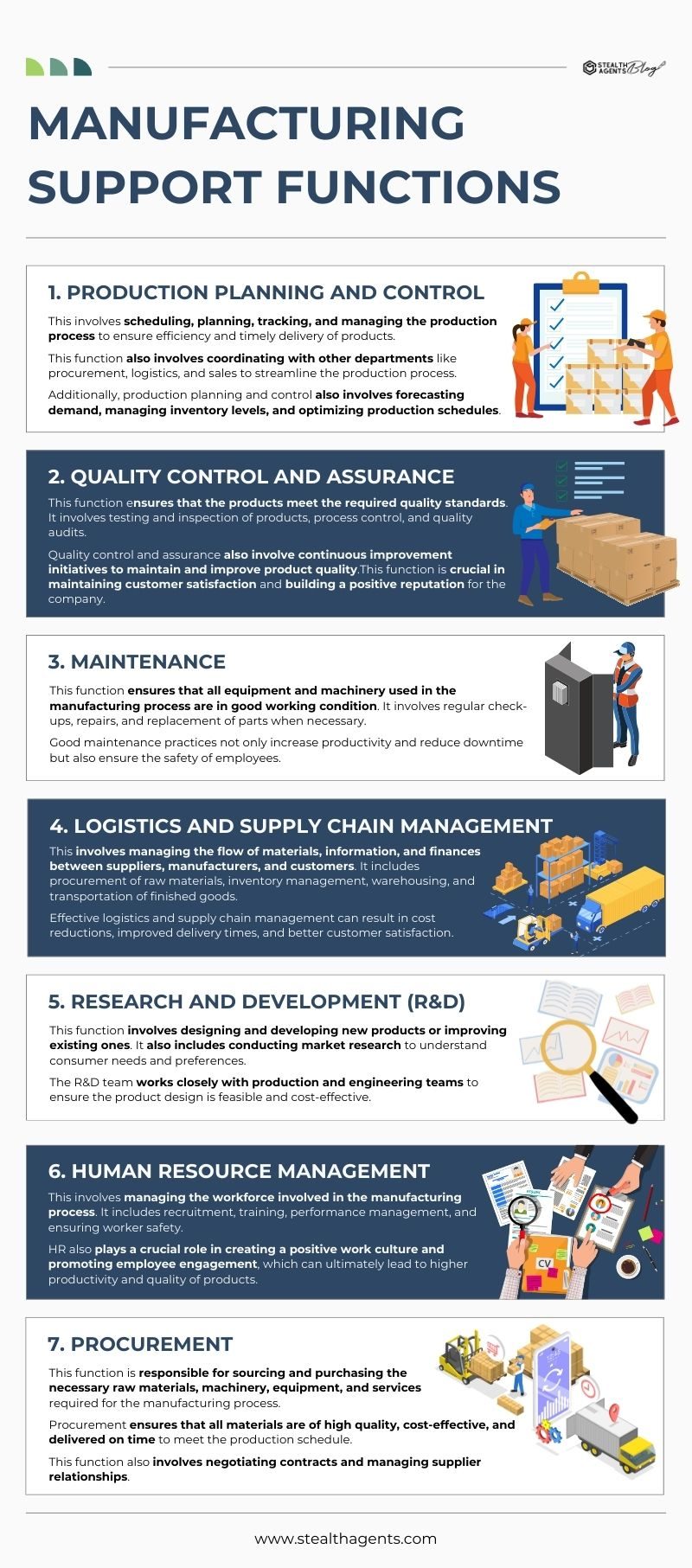
Where to outsource Manufacturing Support Services?
If you’re looking for a reliable place to outsource your manufacturing support services, consider Stealth Agents.
As a leading outsourcing company, Stealth Agents offers a wealth of expertise and capabilities in all aspects of manufacturing support, including production planning, quality control, logistics, and supply chain management.
With a team of highly skilled professionals, cutting-edge technology, and flexible, cost-effective solutions, Stealth Agents can adeptly handle your manufacturing support needs.
Their ability to adapt to market fluctuations and commitment to efficiency make them an ideal outsourcing partner for businesses globally.
So, for superior manufacturing support services, turn to Stealth Agents – your trusted partner in achieving operational efficiency and cost-effectiveness.
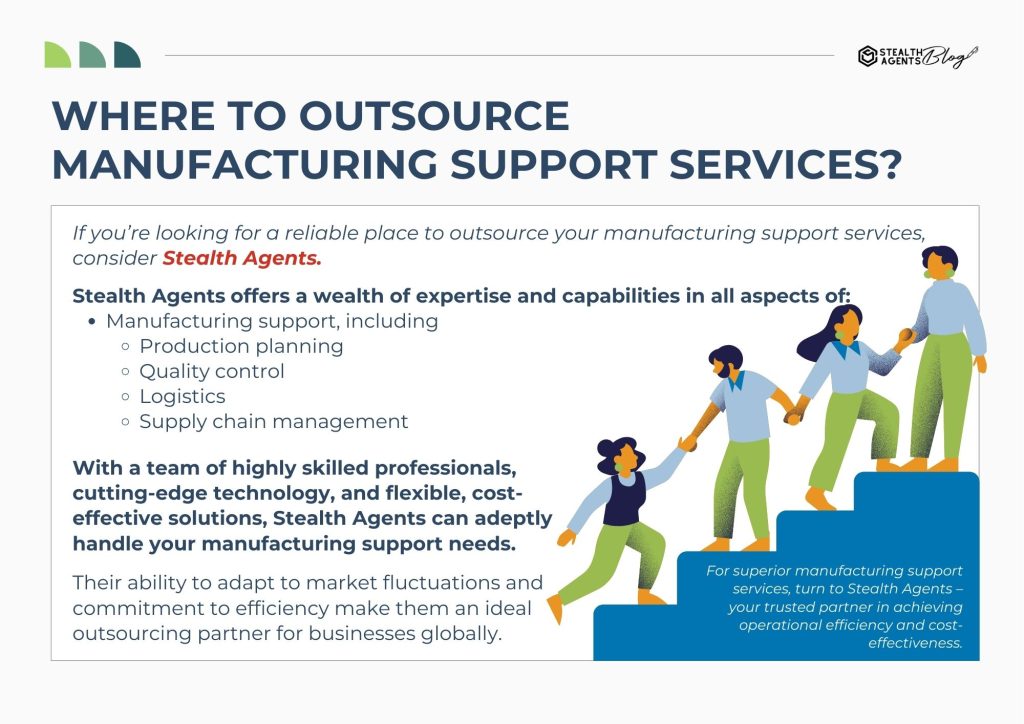
How Do You Choose the Right Outsourcing Partner for Manufacturing Support?
1. Experience and Reputation:
Does the provider have a strong track record in your industry?
Look for firms with proven experience and a good reputation for reliability and service quality.
A company that has worked with similar clients and projects before will be better equipped to understand your needs and deliver high-quality manufacturing support.
Check customer testimonials and case studies to get a better idea of their past performance.
2. Technological Capability:
Are they equipped with the latest manufacturing technologies that meet your production needs?
Assess whether their technological capabilities align with your product requirements and if they are open to upgrading or investing in new technologies just like IT support services for manufacturing businesses ready for any technological advancement.
This will ensure that your products are manufactured with the most advanced methods, which can lead to improved quality and cost-efficiency.
3. Scalability:
Can the provider scale operations up or down based on your needs?
Flexibility in handling volume changes is crucial for responding to market demands and keeping costs under control.
A reliable outsourcing partner should be able to adapt to changing circumstances and maintain the same level of service quality regardless of volume fluctuations.
Ask about their capacity planning and resource management strategies to ensure that they can handle your needs effectively.
4. Cost Structure:
Is their pricing competitive and transparent?
Understand all costs involved, including any hidden fees for customization or expedited services.
Make sure to negotiate a fair price that fits your budget and offers the best value for money.
Remember, the cheapest option may not always be the most cost-effective in the long run.
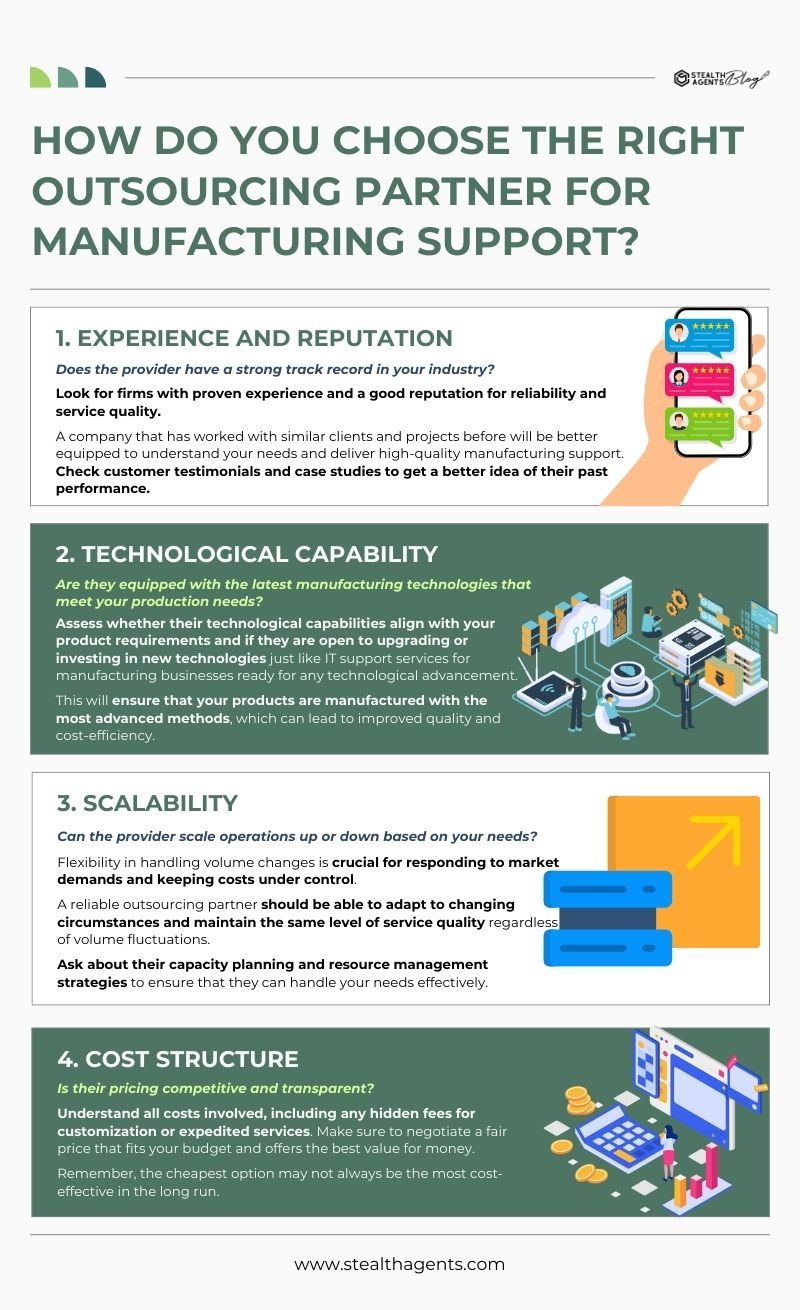
How Can You Effectively Manage an Outsourced Manufacturing Relationship?
Effectively managing an outsourced manufacturing relationship requires open communication, flexibility, and a proactive approach to quality control and risk management.
Regular updates and feedback using technology like video calls and project management tools can help keep the project on track.
The outsourcing partner should be adaptable, able to scale services based on your needs, and ready to adjust processes as required.
Clear expectations for quality standards, regular audits, and risk management protocols are crucial to avoid costly mistakes and delays.
Always remember, a successful outsourcing relationship is a long-term investment, choose a partner that can grow with you.
